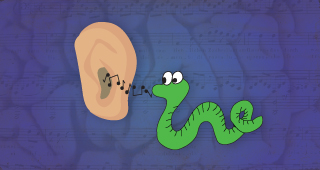 Submitted by Sci Fi Guy on
Submitted by Sci Fi Guy on

The next time a song gets stuck in your head, comfort yourself with this thought: You're probably happy.
When songs weasel their way into your brain--and then take up residence like a CD player stuck on repeat--it generally means you are in a positive state of mind, according to researchers from the University of Montreal.
"A lot of the test subjects said first they were in a good mood, then a song they have positive associations with got stuck in their head," Andréane McNally-Gagnon, a doctoral student in neuropsychology, told The Vancouver Sun. Previous research in the United States and England shows that fully 98 to 99 percent of people have experienced musical earworm at one time in their life and were mostly powerless to shake it off.
McNally-Gagnon says it makes sense that happy people get earworm, since the link between music and positive emotions is well-known. "After the worm left, most people said they were still in a positive mood, but there was also a strong mix of people who described themselves as neutral," she told the Sun.
Why does one particular song get stuck in your head? Generally, it's a mystery, but typically songs that become earworm have catchy lyrics and a repetitive tune and often stimulate memories or reflect your mood at the time. It's more likely to occur when you are doing something that is non-intellectual or requires low concentration, such as walking. Professionally-trained musicians sometimes get complex operas and classical compositions stuck in their head, while the rest of us are more likely to fall victim to pop tunes. And it's not always logical. Adults can easily get a "Sesame Street" song stuck in their heads!
How do you eradicate earworm? There is no surefire method to get rid of it. Some say you should listen to the song several times, while others insist you should listen to totally different music. McNally-Gagnon advises focusing on a task that requires great concentration and has no relation to the earworm. Earworms typically last just a few minutes, but they have been known to torment people for hours or even days.
--From the Editors at Netscape
- 1312 reads